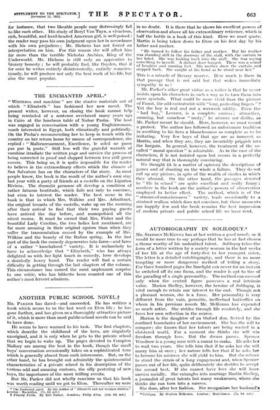AUTOBIOGRAPHY IN SOLILOQUY.* Mn. STEPHEN MCKENNA has at last written
a good novel ; or it would be more true to say perhaps that he has at last chosen a theme worthy of his undoubted talent. Soliloquy takes the form of a letter written by a society woman in the last weeks of her life at the age of forty-five to her youngest sister. The letter is a detailed autobiography, and there is no more tempting or more dangerous method of telling a story. For three hundred pages the limelight can never for an instant be switched off its one focus, and the reader is apt to tire of the parading of a single personality. The method can succeed only when the central figure possesses a real intrinsic value. Marion Shelley, however, the heroine of Soliloquy, is vital enough to retain our interest to the end. Though not a pleasant woman, she is a force. Her personality is very different from the vain, parasitic, ineffectual butterflies on whom in his previous novels Mr. McKenna has expended so much satire. She strides through life resolutely, and she faces her own reflection in the mirror.
Marion is the daughter of an Oxford don, fretted by the
confined boundaries of her environment. She has the will to conquer; she knows that her talents are being wasted in a cloistered world. For a moment she thinks she will win freedom through love. But the dream passes. Spenser Woodrow is a young man with a career to make. He asks her to wait two years. She tells him that if he asks her she will marry him at once ; her nature tells her that if he asks her to become his mistress she will yield to him. But she refuses to stand the strain of a long engagement and, when Spenser passes out of her life, quite deliberately she decides to accept the second best. If she cannot have love she will have success socially. She entangles into marriage Martin Shelley, a journalist of great talents but many weaknesses, whom she thinks she can turn into a success.
She does, after her fashion. She reorgaseizes her husband's *Soliloquy. By Stephen McKenna. Landon: 1,1tailiaaou. us. 6d. net.) life, arranges his manuscripts, prepares his novels for publi- cation, and then makes of his reputation a stepping-stone for herself. The chapters describing• her social rise are incom- parably the best Mr.. McKenna has ever written. They are intensely exciting. The reader is held by the gathering sense of power, the fascination of success. We can rarely withhold our admiration, even if we withhold our approval, from the ruthless resolution that sets itself a goal and pursues undeterred the road that leads to it. Martin Shelley slowly drinks himself to death ; but he has served his wife's purpose : Marion has established herself as the most exclusive hostess in London ; she has the best literary salon in the world.'
It is, however, after her husband's death, after the realization of her ambition, that the real trial of her life comes. She falls in love again, with the son of her old lover, Spenser Woodrow.. And it is here that the heaviest strain is placed on Mr. McKenna's art. The attempt of a woman of forty to make a young man marry her can never be an attractive spectacle, when the story is told from the woman's point of view it is difficult not to find it repulsive. And if Mr. McKenna had allowed the reader to lose his sympathy for Marion Shelley, Soliloquy would have been a failure. But right to the end, although she has lied and cheated in the contest against a younger woman, the impression of Marion's courage remains. She spares no one, least of all herself ; she has none of the qualities that are described as " womanly," she makes use of whatsoever weapons lie to hand, she is without loyalty to her friends ; but in spite of everything she is, as Mr. McKenna has presented her, something rather fine. There is an epic quality about her, about her strength, her courage, her sincerity. She never for one moment deceives herself. She knows exactly what she is doing. Her soliloquy is a memorable achievement.



























































 Previous page
Previous page